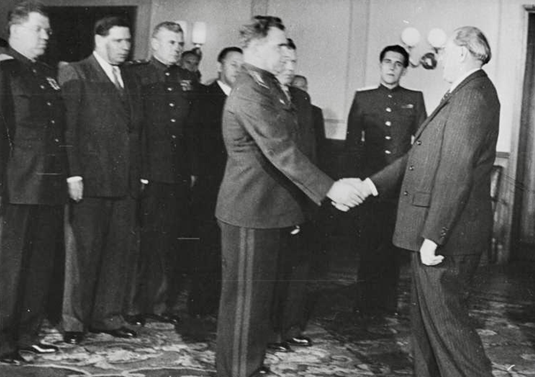An Interview with the Commander
- Maria A. Kithcart

- Jan 2, 2023
- 3 min read

Pictured: Lieutenant-General V. I. Chuikov with his soldiers in Stalingrad on the banks of the Volga, late 1942 or early 1943.
Famous wartime journalist Henry Shapiro interviewed Commander Lieutenant-General Chuikov during the Battle for Stalingrad in late December 1942. Although the encirclement of the Germans took place in November, the fighting was still fierce in the city and the interview had to be conducted by telegraph from the 62nd Army's HQ. Vasily Ivanovich shared as openly as he could during this conversation, which provided useful insights into the nature of the battle. Eventually, the full transcript of the interaction was published, appearing in newspapers across the globe including The Honolulu Advertiser on 2 February 1943. An excerpt of this account capturing the words of the Commander of the 62nd Army follows:
“I want to say a few words about our weapons. The war has proved all our weapons, from rifles to cannon, are very good provided they are properly used. In the Battle for Stalingrad the Russian hand grenade won general respect. It is much better than the German hand grenade.
Extremely popular (sic) with the Germans is our 'Katyusha,’ which the enemy calls 'Stalin's Machine.' All living objects are destroyed wherever its shells burst. However, all these weapons would have been of no value if they were not in the hands of men willing to die for freedom. All our men used to say: ‘There's no land beyond the Volga.’
Experience in the battle of Stalingrad already allows us to draw some conclusions. Each city, each building can become a fortress if quickly and skillfully adapted for defense, and if the soldiers don't fear encirclement and are not afraid to get into the houses and stay there.
The battle inside the city is a fight at close distance when light weapons--bayonets, rifles and light machine guns are used. The fighting inside the city requires the greatest initiative from every officer and soldier. One should not be afraid to take position in the immediate neighborhood of the enemy. The nearer to the enemy, the smaller the losses.
“It is very important to train more snipers. This is profitable business. Costs are small-a few cartridges; revenues are many enemy corpses.
Radio communication is very important. Wire often is cut by shells, bombs or fire. Radio sets require specially constructed dugouts. In one engagement, four radio sets went out of action at once although there was no visible damage. Radio sets are delicate apparatus, and in that dugout even the tea glasses burst from shell shocks.
"German propaganda went too far sometimes. Once four Germans drove up to our positions in a car. We asked them where they were going. They replied they were going for some food and some eggs—’Our radio and our newspapers announced Stalingrad's fall.'
Winter has come. Winter is our element. The Russians are well adapted to fight in winter, and no matter what preparation the Germans made for winter, we are better prepared.
The officers who served under General Chuikov described the appearances of his quarters as follows: ‘They are simply furnished with maps on the walls and table. Now and then one hears a rustling sound; it is the earth sliding off the dugout's log walls as the ground is shaken continually by blasts from shells, mines and bombs.’ […]
When asked to explain how the defense of Stalingrad, which General Chuikov called a miracle of modern war, was accomplished, his officers simply quote their leader: ‘Guts and readiness to die.’”



